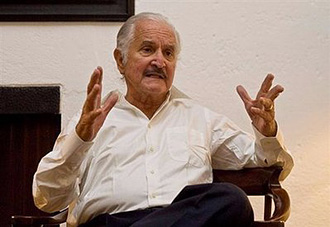
|  |  |  Entertainment | Books | November 2008 Entertainment | Books | November 2008  
Mexico Violence Overtakes Fiction: Fuentes
 Agence France-Presse Agence France-Presse
go to original


| | Mexican writer Carlos Fuentes speaks during a interview with AFP in Mexico City, on November 6, 2008. "We want to be writers but they turn us into prophets," said Fuentes, one of the Spanish-speaking world's best-known living novelists, whose latest book explores Mexico's growing violence. (AFP/Ronaldo Schemidt) | | |
Mexico City – "We want to be writers but they turn us into prophets," said Mexican author Carlos Fuentes, one of the Spanish-speaking world's best-known living novelists, whose latest book explores Mexico's growing violence.

One character in "La voluntad y la fortuna," or "Will and Fortune," is decapitated in the thousandth case of the year in an exaggeration that is not far from reality in Mexico these days.

Gruesome killings including beheadings, shootings and even injecting a child with acid figure have figured among daily death reports, with some 4,000 people killed in gangland-style violence so far this year.

"I wrote the novel before several cases of decapitations appeared in 2006 in (southwestern) Guerrero state, the site of the throat-slitting of one of the main characters in the book," Fuentes told AFP in his house in a southern suburb of the Mexican capital.

"Reality exceeds fiction."

Fuentes is one of Mexico's most celebrated literary figures, the author of more than 20 books.

"La voluntad y la fortuna," just out in Spanish, recasts the Cain-and-Abel story to portray violence in Mexico, where battles between drug cartels over trafficking routes into the United States get more gruesome by the day.

Fuentes, a current affairs enthusiast, underlined his long-held belief that, now more than ever, "the only way to curb the violence of the drug cartels in Mexico is by legalizing drugs."

"If six or seven countries agreed with each other to legalize drug-taking, we would end it with the drug traffickers," said the celebrated novelist.

Fuentes first pushed for drug legalization after winning the prestigious Cervantes Prize in 1987, but the move was soon rejected.

The topic has surfaced again recently as politicians seek to curb the escalating drug crime.

The government's deployment of some 36,000 troops across the country almost two years ago has failed to stem the violence.

"Legalizing alcohol didn't stop the drunkards in the United States, but it stopped the Al Capones, and, in the same way, legalizing drugs won't solve the problem of addicts, but at least it would stop the drug traffickers," Fuentes said.

The internationally acclaimed writer hailed Barack Obama's win in the US elections last week, looking forward to a new phase in historically bumpy relations between the two neighbors.

"Obama's election is great news and I think that he will be able to get on and reach beneficial deals on topics such as migration with (Mexican President Felipe) Calderon," said Fuentes, encouraged by the similarity in age of the two leaders.

Looking south, Fuentes warned that Latin American democracies today face the challenge of ending poverty to avoid "demagogic governments that can be the base of new dictatorships."

Fuentes has influenced contemporary Latin American literature, and his works have been widely translated into English and other languages.

The prolific writer maintains a daily routine of getting up very early and working without breaks.

"There are no mysteries. You have to work a lot," he said.

His current projects include a new book of short stories, and a novel about rebel Colombian leader Carlos Pizarro, who was assassinated as a 1990 presidential candidate.

"Life is life. It has highs and lows, triumphs and failures," the writer said, on the eve of his 80th birthday. |

 |
|  |



